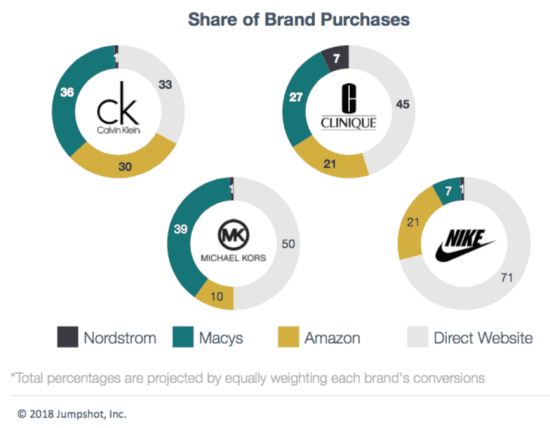Chart of the Day: New research shows the dynamics of digital marketplaces
When creating a digital marketing strategy, it's important to use the analysis time to accurately understand the dynamics of your digital marketplace. In my articles and visuals on digital marketplace analysis, I show how a methodology for summarising the online marketplace from a customer perspective through creating a marketplace map. The example map from ZenithOptimedia in that article shows a practical tool to summarise opportunities to interact and influence with consumers through their customer journey.
How important are brand Ecommerce stores?
One of the significant business model developments facilitated by the Internet is that brands can now sell direct to customers (sometimes know as a the direct-to-consumer D2C business model) either through their own site, e.g. the Nike.com Ecommerce store, or through marketplace stores on Amazon or eBay.
This new insight compares the relative popularity of these marketplace options for consumers and their importance to brands. The visual shows that for brand including Nike, Clinique, Michael Kors and Calvin Klein) that the direct website can be really important compared to major multichannel retailers such as Macys and Nordtrom in the United States.

Effectively, the direct website has become the single most important retail distribution channel for these brands, although from this chart we don't know the overall importance for the brand Ecommerce store compared to all the pureplay online retailers and multichannel retailers.
How is this data collected?
You may be wondering how, without access to the analytics of the brands, an insights company like Jumpshot can stitch together the customer journeys. The answer is that they use a panel of consumers you use 100 million devices tracks 5 billion actions a day to deliver insights into online behaviour from every consumer action wherever they are in the stage of their journey. To make this data representative of cross-device behaviour around half of the devices are desktop and half smartphone. They have data for around 30,000 manufacturer brands current.
Research source






